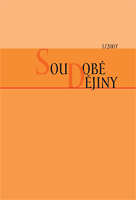Lev v kleci: Návrat Lva Sychravy z emigrace v roce 1955
Lion in a Cage: Lev Sychrava’s Return in 1955
Author(s): Jiří PernesSubject(s): History
Published by: AV ČR - Akademie věd České republiky - Ústav pro soudobé dějiny
Summary/Abstract: Lev Sychrava (1887–1958) was an important Czechoslovak journalist, the only topranking exile to take advantage of the 1955 amnesty offered by the Czechoslovak régime to those who wished to return home. The author tells Sychrava’s story with an emphasis on this particular aspect towards the end of his life. First, he discusses Sychrava as a “Masaryk and Beneš man,” connected to the fate of the First Republic: from his start in politics in the Czech Progressive State Rights Party in Austria-Hungary to his time as an émigré during the First World War, where he became a close collaborator of Tomáš Garrigue Masaryk (1850–1937), his short career as a legate in Paris, his career as Deputy Chairman of the Community of Czechoslovak Legionaries, from 1921, and particularly as Editor-in-Chief of the ex-Legionary daily Národní osvobození (National Liberation) from 1924. He remained in these posts till the German Occupation, which began in mid-March 1939. After the outbreak of war, Sychrava was interned in the Buchenwald concentration camp. After the Liberation in May 1945, he returned to his vocation, but remained there only till the Communist takeover. At the end of May he tried to emigrate, but was unsuccessful. A month later, however, he managed to leave the country with offi cial permission. Once abroad he joined émigré organizations, and played an important part particularly in establishing the Edvard Beneš Institute for Political and Social Studies, in London, in 1950, and in its subsequent work. At the same time, however, his views earned him the reputation among his fellow-émigrés of being left-wing, and he found himself isolated. (Sychrava interpreted the show trial of Rudolf Slánský [1901–1952] and others, for example, as the victory of the Gottwald Stalinist line over the Trotsky line and as the arrival of democratic Socialism in Czechoslovakia.) In 1952 Sychrava therefore inquired into the possibilities of returning home to Czechoslovakia. His efforts were more than facilitated by the amnesty for émigrés to return home voluntarily, which was announced by President Antonín Zápotocký in May 1955. Operation “Return,” as it was called, was run by the State Security Forces (StB) with the aim of dividing and weakening the émigrés. Sychrava took up the offer in December 1955. The author demonstrates that in returning home Sychrava fell prey to illusions about the regime and the possibilities of resuming his previous work in his homeland. The author describes the largely poor conditions Sychrava lived in as soon as the regime lost interest in him. Although he did not come out publicly against the émigrés, the StB managed to use his one public meeting for their own propaganda purposes. Amongst the émigrés, Sychrava’s return to Czechoslovakia caused indignation, and his old friends at home treated him with scepticism, mistrust, and disdain, partly because, despite certain reservations, Sychrava in essence identified with Communist policy and made no se
Journal: Soudobé Dějiny
- Issue Year: XIV/2007
- Issue No: 04
- Page Range: 607-650
- Page Count: 44
- Language: Czech

